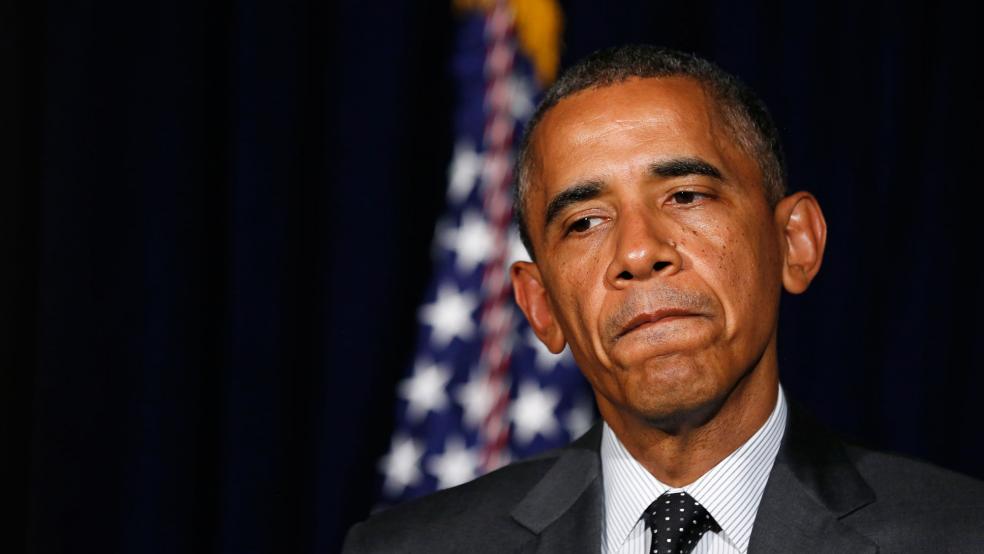In his speech on the economy scheduled for this afternoon, President Obama faces a difficult challenge: persuading an electorate that things are getting better when, for a large part of the country, there’s little tangible evidence to prove his point.
“It’s been an economic recovery that’s been great for corporations and their profits and therefore great for the stock market which reflects their profits,” said Barry P. Bosworth, a senior fellow in the Economic Studies Department of the Brookings Institution. “It has not been a great recovery for workers.”
Related: New Evidence of How Unemployment Wrecks Families
So even though the economy is demonstrably improving, Bosworth said, when it comes to talking about it, the president is in a bind. “It’s usually best for presidents not to say too much because there is always going to be a group of people for whom it’s not true,” he said. “The people for whom it’s true aren’t going to be very vocal, because they attribute their success to themselves, and the people who are not doing better tend to blame the government. It’s a losing game.”
“Trying to sell the economy as in recovery is a stretch and a struggle for the president,” said Aparna Mathur, an economist at the American Enterprise Institute.
“Polling shows that most people feel that they’re not out of the crisis,” she said. “We still have 9 to 10 million people who are unemployed, and 30 percent of those are long term unemployed, meaning they haven’t had a job in more than 27 weeks. A lot of people don’t buy that we are out of the crisis.”
At the same time, Mathur argued that businesses are not hiring at levels consistent with full employment, in part because the administration is “holding back the recovery through policy measures that need not have been imposed at this time.” She said increased regulation and the advent of the Affordable Care Act’s employer mandate, which kicks in next year, are promising higher costs for businesses going forward. “So businesses are absorbing these costs as well at a time when the economy is recovering in fits and starts.”
Related: Jobless Receiving Unemployment Insurance at a Record Low
“It’s a huge challenge,” agreed Jared Bernstein, a senior fellow at the Center on Budget and Policy Priorities. “In these kinds of speeches, the president generally has two objectives. First, he needs to elaborate the progress that has occurred over his watch – and it’s real and significant. There’s no question in my mind that policies with his fingerprints all over them helped pull forward a recovery that is reliable and consistent and gaining a bit of steam. His second task is much harder. He has to admit that while all of those statistics are on the books not nearly enough of the improvement has reached the middle class, the working class, and the poor.”
Bernstein said Obama will likely at least mention the fact that Republicans in Congress have blocked most of his legislative proposals for improving the economy.
“That isn’t exactly an uplifting message either,” he said.
One possibility, Bernstein said, is that Obama will use the speech as an opportunity to speak to voters about the need for a functional Congress to complete an economic recovery.
Related: How Extended Unemployment Myths Hurt Millions of Jobless Americans
“He needs to speak to the electorate and explain to them that an advanced economy like ours cannot function with a dysfunctional Congress,” Bernstein said. “It can slog along for a while but you need members with the capacity to diagnose problems and propose solutions.”
But when it comes to speaking to the voters, Obama may also find himself tripping over one of the chief conflicts among economic policy scholars at the moment: the timing of interest rate increases. Though the leadership of the Federal Reserve seems determined to keep rates low, in part in order to provide continued economic stimulus and, hopefully, to create jobs, there is a strong lobby who think further stimulus is unnecessary.
Financial market participants and others “are pushing very hard for the U.S. to abandon economic stimulus,” said Bosworth. “They want higher interest rates. They want a return to normality.”
Related: What Happens When the Fed Stops Propping Up Stocks?
These are people, Bosworth said, who have outsized influence on the public debate, and they look at the economy, as it effects them, and say, “This is good enough.”
However, he said, “There are still, at the bottom of the income distribution, a lot of people who are not doing very well. They don’t have much of a voice in the debate, but they have a large voice in the election. I think it would be a mistake for the president to get caught in a situation where he is saying that the economy is getting better.”
Top Reads from The Fiscal Times:





